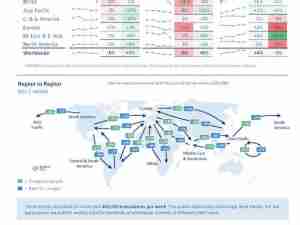Airbus Is Said to Offer China Work on A380 to Attract New Orders
By: Ania Nussbaum and Benjamin Katz | Jan 08 2018 at 10:34 AM | Air Cargo
Airbus SE is offering China a production role on its A380 superjumbo for the first time in an effort to secure a program-extending order for the slow-selling double-decker jet, according to a person with knowledge of the situation.
The European planemaker is in early talks on granting finishing and interiors work to the Asian nation if it commits to a significant new order for the model, said the person, who asked not to be named as the negotiations are confidential.
New sales are crucial for the A380 after a two-year order drought, though moving some work to China could upset the delicate production balance between the planemaker’s French and German plants. The planes are now assembled at the company’s headquarters in Toulouse, France, and subsequently flown to Hamburg for painting and the fitting of cabin furnishings including toilets and seats. Having that work done elsewhere is unlikely to be entirely welcomed by Airbus’s German workforce.
The person said that only Chinese-ordered planes would be affected and that no decision has been made at present. Further discussions may take place this week during an official visit to China by French President Emmanuel Macron, who is leading a major trade delegation that will include Airbus officials.
A spokesman for Airbus, which is part-owned by the French and German governments, declined to comment on whether China has been offered A380 work, saying the topic is “industry speculation.”
The FT reported earlier on a possible industrial partnership with China on the A380.
Emirates Setback
Airbus is seeking ways to revive the A380 after last year failing to secure a new order from Dubai-based Emirates, the superjumbo’s biggest customer. Without a major deal the model’s future is in doubt, even with the company seeking to eke out work by slowing output to less than a plane a month.
France’s Economy Minister Bruno Le Maire said last month after a visit to China that the country had agreed to include the A380 in discussions regarding aircraft requirements. Those talks included the development of a version adapted to the world’s second-largest economy, the person said.
China has so far bought only five A380s, operated by China Southern Airlines Co., which has struggled to find destinations suited to the jets, having switched them between a variety of routes. The uptake from the world’s most populous country is far behind the original projections of Airbus, which had designed the superjumbo with Asian demand in mind.
Created as a pan-European industrial project, Airbus and the governments that own stakes have always been keen to maintain a geographic balance of manufacturing work.
Equilibrium
France and Germany share the bulk of final assembly—though the latter’s role is restricted to the A320 narrow-body— while the U.K. has proven expertise in designing and building plane wings and Spain focuses on military models such as the A400M troop transport.
The production equilibrium has come under strain before, with Germany complaining that it didn’t get a fair deal on the A350, Airbus’s newest wide-body aircraft. As a consequence, the state withheld a tranche of a development loan in 2012 as it sought to pressure the company to review the work share.
The location of A380 handovers, often surrounded by much fanfare, depends on the location of the customer, with Hamburg’s short runway unable to handle fully-fueled double-deckers, so that planes bound for Australia or Singapore, say, are dispatched from Toulouse.
Airbus separately will lift A320 output at its Chinese plant in Tianjin to five a month from four now, with an agreement due to be announced Tuesday during Macron’s visit, according to people familiar with the matter. The tour may also be accompanied by a large plane order, though it’s likely to be too soon for the A380 to be included in any purchase.
Airbus confirmed that it is studying lifting rates in Tianjin to meet demand for its single-aisle family, while declining to comment on the potential scope of a ramp-up, as well as on possible orders.
